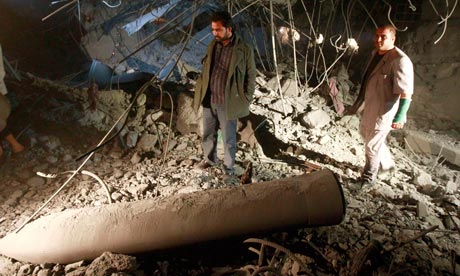Gaddafi family deaths reinforce doubts about Nato’s UN mandate
![]()
Regime claims attack that killed son and three grandchildren was aimed at Libya’s leader, as allies accused of overstepping UN security council resolution
Julian Borger, Ian Traynor in Brussels, Ewen MacAskill in Washington
The missile reportedly fired during a Nato air strike is seen in the Tripoli house of Libyan leader Muammar Gaddafi’s son Saif al-Arab, who died in the attack. Photograph: Louafi Larbi/Reuters
Nato is facing urgent questions about the legality of its air strike on a Gaddafi family compound at the weekend, which the Libyan government said had killed the leader’s second youngest son, 29-year old Saif al-Arab, and three grandchildren under 12. The grandchildren were not named.
The Libyan government spokesman, Moussa Ibrahim, said Muammar Gaddafi and his wife, Safiya, had been in the building at the time, but had escaped injury. He said the aim of the attack was clear: to assassinate the Libyan leader.
Nato swiftly scrambled to deny that it was targeting any individuals, insisting that it was only interested in attacking the military command structure.
The prime minister, David Cameron, told the BBC that UN resolutions permitted attacks against the regime’s “command and control” sites because their aim was to prevent “a loss of civilian life by targeting Gaddafi’s war-making machine”.
But the deaths of Gaddafi’s three grandchildren, if confirmed, will reinforce the doubts of alliance members uncomfortable with Nato’s six-week bombing campaign and generate criticism from countries such as Russia that Nato is pushing beyond its UN security council mandate.
“Statements by participants in the coalition that the strikes on Libya are not aimed at the physical destruction of … Gaddafi and members of his family raise serious doubts,” the Russian foreign ministry said. “The disproportionate use of force … is leading to detrimental consequences and the death of innocent civilians.” The ministry called for “an immediate ceasefire and the beginning of a political settlement process without preconditions.”
The Venezuelan president, Hugo Chávez, said in Caracas: “There is no doubt the order was given to kill Gaddafi. It doesn’t matter who else is killed … this is a murder.”
The attack, which one diplomatic source said had been carried out by Danish airmen possibly in an F16 bomber, ripped through the Gaddafi residence at around 8pm on Saturday night. It was the second time in recent days that an airstrike has come close to the Libyan leader, and Ibrahim indicated that someone within the leader’s circle may have leaked intelligence on his whereabouts.
But in Washington, Stephen Hadley, former national security adviser in the Bush administration, warned that the assassination of Gaddafi by Nato aircraft could prove counterproductive.
“The narrative we want to come out of this is that the Libyan people overthrew a dictator – not that we came in and toppled a despot,” he told CNN. “What we really want him to do is to leave or to die at a Libyan hand, not an American hand.”
But senior Republicans expressed little concern over the prospect of Gaddafi becoming a casualty. Senator Lindsey Graham told Fox News: “Wherever Gaddafi goes, he is a legitimate military target. He’s the command and control source. He’s not the legitimate leader of Libya and the way to get this to end is to go after the people around him and his support system.”
Reminded that assassinating foreign leaders is illegal, Graham said: “In my view, he’s not a foreign leader, he’s a murderer.”
John McCain, another Republican senator who specialises in foreign affairs, told CBS: “We should be taking out his command and control. If he is killed or injured because of that, that’s fine.”
Michele Bachmann, a Republican congresswoman considering seeking the Republican presidential nomination who was also on the Sunday talk shows, said it was foolish of Barack Obama to have become involved in Libya. She told Fox: “When President Obama went in, his doctrine was to enter Libya for humanitarian purposes. The point of what I am saying is that we are seeing many, many lives lost, including innocent civilians’ lives.
“What will be the ultimate objective and gain? I don’t see it. I think it was a foolish decision to have gotten involved.”
In spite of criticism by Russia that Nato is trying to assassinate Gaddafi, Moscow has stopped short of raising the attacks at the UN security council.
The Libyan government has been pressing Russia and China to challenge the legality of the Nato action. Both have expressed sympathy with the argument that Nato strikes against compounds where Gaddafi and his family live go beyond the UN mandate to protect civilians in rebel-held areas.
A UN security council official said on Sunday that there was no sign of Moscow seeking to bring the issue up at the security council. The official said China was taking its cue from Russia. Both abstained in the vote on the resolution sanctioning action against Libya in March.
According to British diplomats, the Gaddafi regime retaliated against the airstrike by dispatching a mob to attack western embassy buildings, which have been abandoned in recent weeks as the hostilities have gathered pace.
A spokeswoman said a building housing the ambassador’s residence had been set on fire, and according to initial reports had been burned down. Sky News journalist Mark Stone, who visited the embassy, reported on Twitter: “Totally burnt out. WW2 memorial smashed on the ground. Burnt out cars. Looted.”
A British official, speaking on condition of anonymity said there was no doubt in London that the mob attacks had been officially sanctioned. “There are no demos allowed to move anywhere in Tripoli unless they are 100% orchestrated by the regime.”
William Hague said: “I condemn the attacks on the British embassy premises in Tripoli as well as the diplomatic missions of other countries. The Vienna convention requires the Gaddafi regime to protect diplomatic missions in Tripoli. By failing to do so that regime has once again breached its international responsibilities and obligations. I take the failure to protect such premises very seriously indeed.”
Omar Jelban, the Libyan ambassador, who has worked as a diplomat in London since 2001, was given 24 hours to leave. Britain expelled five Libyan diplomats in March, on the grounds that they were a threat to national security.
Bombing aftermath: Twisted metal and a TV still on
It was a heavy blow, but not heavy enough to deflect the regime’s minders from their job. Within hours of the Nato attack on the house of Muammar Gaddafi’s youngest son, foreign journalists were being escorted through the shattered building to see for themselves the destructive impact of Nato air power.
The Gaddafi family complex, comprising two residences in a wealthy residential area of Tripoli, was a grotesque combination of the broken and the banal. One building was a wreck of shattered concrete and twisted metal, with an unexploded missile lying in the middle.
Libyan officials said the house had been hit by three missiles but only two had exploded. Dust and smoke rose from the rubble which included smashed toilet bowls, bathroom of smashed sinks and furniture amid demolished ceilings and walls. The kitchen clock had stopped at 8:08. Cooking pots with leftover food, including stuffed peppers, noodles and a stew, had been covered with aluminum foil.
In one room, the television was still turned on and a pile of PlayStation games lay on a sofa, including Modern Warfare 2 and Fifa Soccer 10, according to a Washington Post reporter. A pair of Homer Simpson slippers was half buried in the dust, and fruit lay in a bowl near a small green regime flag. Blood stains were visible on the wrecked furniture.
In a children’s bedroom next door, half an apple, clearly cut earlier in the evening, lay chopped up on a table between two beds. A children’s book lay on the ground. A table football machine stood outside in the garden of the house.
Crowds later gathered at the compound calling for revenge.
In Benghazi meanwhile celebratory gunfire rang out, even though many residents did not believe the news.
Related Articles
El Salvador, entre el Norte y el Sur
![]()
Este domingo se celebran elecciones presidenciales El Salvador, uno de los 6 estados de Centro América, tiene la extensión territorial
Stop TTIP
![]()
During this one year, 2015, 3,284,289 European citizens signed the European Citizens Initiative and set a strong signal against TTIP and CETA
German multiculturalism ‘failing’
![]()
Angela Merkel, Germany’s chancellor, has said that the country’s attempt to create a multicultural society has “utterly failed”, adding fuel



